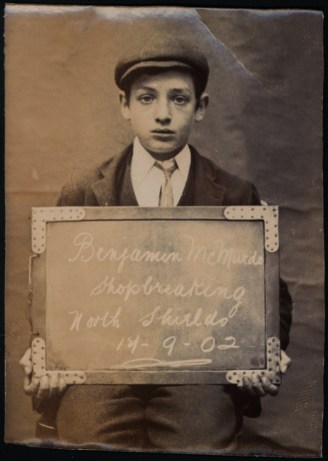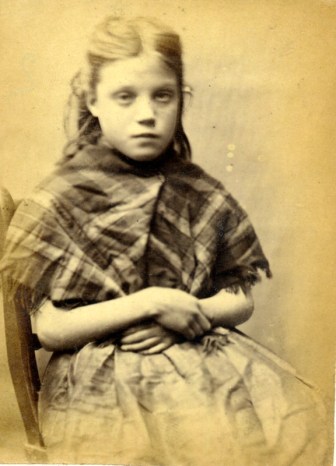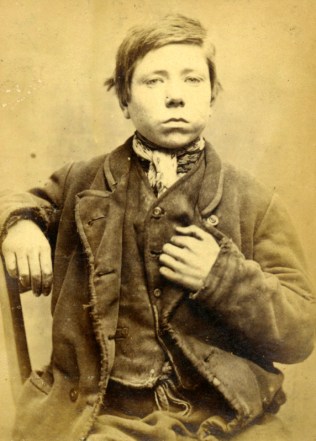
Our great great aunt, Jennie Evans, was a Southwark native, born and bred in the Borough, the granddaughter of a Welsh cowkeeper. Jennie married a shoemaker named Richard Vanson, also from Southwark, but unlike his wife, Richard was only the second in his immediate family to be born in London. His roots were in the gently rolling hills and patchwork fields of Barham, Kent, where his father Stephen was the firstborn son of a farm labourer. There were other Vansons in the area, probably relatives, and in the village churchyard the inscription on a headstone gives some insight into the character of at least one of them, perhaps the eponym of our own Southwark-born Richard: “To the memory of Richard Vanson who died June 30th 1828 aged 25 years. In simple guise let this best praise appear. Stranger, an honest man lies buried here.”
There’s no reason to suspect that our Richard was anything less than honest, but the same cannot be said of his father Stephen. Perhaps hoping to escape rural poverty, a young Stephen left the small village of Barham and took a job as a footman in the home of Thomas Barker Bass, a divorced attorney-at-law, in the seaside town of Dover. Stephen’s name appears on the 1851 census beneath that of his employer and two other “general servants.” How long he held his post or why he left it isn’t known, but records place him on HMS Beagle (not of Darwin fame) at some point during the Crimean War, awarded the Medal for the Crimea. Perhaps drawing on his experience as a footman, Stephen was a gun room steward, serving in the junior officer’s mess on Beagle. On the same medal list for HMS Beagle was Ordinary Seaman James Walsh. When the war ended the two young veterans drifted east searching for work, but within a few months things had spiraled out of control.
October 1856 found Stephen and James in the city of Hereford, twenty six kilometres from the Welsh border, their names recorded more infamously than they would have liked. The story of what occurred appeared in the Hereford Times: “Daring Burglary in Hereford – Clever Capture of the Burglars.” Stephen and James were two of the gang. They and another young man, John Davies, all “strangers to [the] city,” had taken rooms at Powell’s lodging house in Berrington Street, and perhaps already had had a target in mind for their dastardly deed. Nearby was the shop of a watchmaker and jeweller, with a residence above, and an hour or so after midnight on October 9th, the would-be thieves slunk to the back of the premises and cut away a wire grate, squeezing themselves into the kitchen. Stephen used a skeleton key to gain access to the shop, and the robbery might have come off undetected but for the pitch darkness of the room. James Walsh struck a match, and as luck would have it, out in the street on his nightly rounds was Sergeant James Griffiths of the city police, who spied the light right away. He knocked on the door, calling the shop owner’s name, but the light was immediately extinguished and no reply came. He hurried around to the back of the shop and saw the three men run from the building and make their escape through the pig market. He shouted for help and gave chase, apprehending Stephen in a granary, while another policeman nabbed James Walsh. John Davies made it back to the lodging house but the police caught up with him there, and in custody at the station house, the men expressed remorse on learning the shop belonged to a widow. Despite being desperate, they’d never have done the job, Stephen claimed, had they known their victim was a widow.

At the Assizes in December, a week before Christmas, Stephen and his accomplices stood before Mr. Baron Watson, who listened to their claim that they’d been “weary of a vagabond life,” and with the spoils of the burglary they’d hoped to “set up in a respectable way of business, and hereafter lead a life of honesty and good conduct.” The judge advised them to accomplish such a “praiseworthy object … by honest means” noting that “he had a very strong suspicion that at least one of the prisoners had been engaged in such work before.” He then sentenced the three men to one year hard labour. For Stephen, left waiting was Ellen Douglass, ten years his junior and just sixteen, pregnant with their first child Annie, who would be born in Old Down, Gloucestershire, in 1857 while her father was in jail.
Likely no mug shot ever existed of Stephen Vanson, but it was around the time of Stephen’s troubles that Bedford Prison governor Robert Evans Roberts came up with the idea of photographing convicts as a means of documenting habitual criminals. Some of the images exist today, along with details of their crimes and punishment. Little distinction was made between children and adults, and there was no sympathy for the situations prompting the crimes – hunger, homelessness, sickness, unemployment. Stephen was twenty six when he received his sentence of hard labour, but a similar punishment was frequently meted out to children, as the photographs and their details attest.

Whether Stephen was influenced by the unsavoury types he met in prison, or whether he was himself of that character we can’t know, but in 1859, again a free man, Stephen and his young family of Ellen Douglass and daughter Annie appear in Merthyr-Tydfil, Wales, a place of ill repute. Merthyr-Tydfil was one of the most notorious districts in Wales, nicknamed “China,” probably in reference to Britain’s so-called “opium wars” with China around this time. The propaganda of the day reinforced the idea of China as the enemy, a place of dangerous foreigners, and a no-man’s land. Merthyr-Tydfil’s “China” was a den of thieves, rogues and prostitutes, and respectable people entered at their peril. Bounded by water and a row of large dwellings, entrance to the district was through a narrow arch, and even the police did not go there.
But Stephen and Ellen did, and lived in Merthyr-Tydfil long enough to have two more children born there. The South Wales Police Museum explains what might have attracted our Vansons, writing that the district saw a steady stream of jobseekers, but those who couldn’t find the work they sought also could not afford to go back where they came from, and many resorted to begging and stealing to scrape together a living. Stephen seems to have learned his lesson in Hereford, though, for there are no further records to suggest he was ever again anything other than a poor hawker, and Ellen a “hawker’s wife.” When they finally married in 1862 it was at St. Saviour’s church in the Borough, Southwark, where they began a new, and sadly short chapter of their lives.
♦
Sources
- Tyne and Wear Archives and Museums
- South Wales Police Museum
- “Daring Burglary in Hereford – Clever Capture of the Burglars.” Hereford Times, 11 October, 1856
- “Capture of Gang of Burglars in Hereford.” Hereford Journal, 15 October, 1856
- “The Burglary at Mrs. Lamberts’ Shop.” Hereford Times, 18 October, 1856
- “Original Mugshots Show the Faces of Victorian Crime.” The Times, 13 February, 2013
- Barham Village History www.barham-kent.org.uk

The pictures speak a thousand words. It is hard to even imagine the plight of these young people, some still young children. Desperation to survive becoming a way of life for many of them. Not easy to take in, but good to know. Thanks again for these great vignettes. I look forward to them each week.
LikeLiked by 2 people
Thanks for following!
LikeLike
Pingback: Lloyd’s “Long Lost Relatives” and the children of workhouse schools – The Cowkeeper's Wish
Pingback: “There is no more detestable creature …” – The Cowkeeper's Wish
Pingback: Jennie and George and Grace: Down a Rabbit Hole – The Cowkeeper's Wish